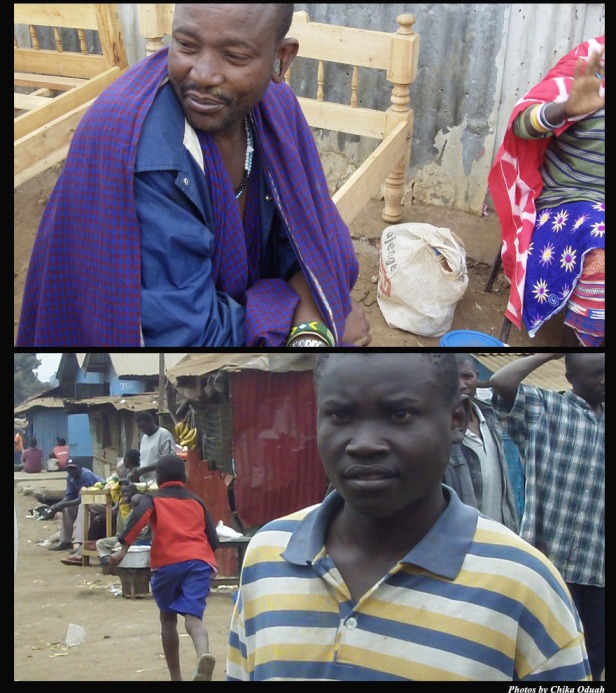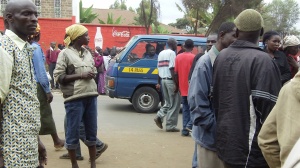We stayed in Kibera for nearly 3 hours and I became increasingly anxious. I could no longer ignore the pain shooting up from my ankles. Walking in heels in such a landscape was so difficult. Had I known where I would be going, I would have worn flats. Twice, I fell into the sticky pool of water in the middle of the dirt road. The same water that carried drops of feces, chicken fluid, and who knows what else. I thought to myself, “there’s no way I can ever disinfect these shoes enough to wear them again.”
I began to feel a wave of nausea and tried to make sure the dizziness didn’t show in my face. At first, I didn’t mind the huge flies, but then I thought of what germs they may be carrying. Standing in place, I began to make sure I twitched my limbs every so often, chasing away the bugs.
Green, in Kibera! One man had begun growing kelp. They stood tall and healthy. The man was very soft-spoken. He was proud of his crops. After speaking with him, we continued to walk around Kibera.
I didn’t realize how tired I was until we got back into the car. I said goodbye to Lawrence and Wyclef. In the newsroom, a strange feeling came over me. I still can’t describe it, but I remember it. Inside, I couldn’t stop shaking. The nausea, I couldn’t get over it. I ran into the restroom to clean my shoes, but they don’t keep tissue in there. Running around looking for tissue, I became flustered and couldn’t get the image of those children out of my head. The child standing underneath the clothing line with his hands clasped behind his back, wearing white like an infant phantom. His head covered with a hat. Haunting me. That’s what he was doing. That’s what he’s still doing. Even as I write this now, itchy sensations tingle down my spine. Kibera.
I finally found tissue, ran back into the restroom and cleaned the bottom of my shoes. The smell from the bottom of my soles filled the bathroom- a mixture of every unclean thing you can imagine. My stomach churned as I scrubbed my hands under the faucet. Back in the newsroom, I put on my extra pair of shoes. But I couldn’t sit still. Knowing that I had to edit the footage from the bus accident, I still couldn’t keep my mind at rest.
Finding refuge in a quiet space somewhere, I called my best friend. In the States.
I needed 10 minutes to sort my thoughts with someone. Just 10 minutes. I told him where I had been, but the words couldn’t come out right. After asking the right questions, he was able to get some inkling of the story. I told him what I had seen, really, it’s the stuff from movies. Does the grandmother sleep on the dirt? What about insects? Rats? Do they tickle her feet? My mind couldn’t ask the question, before it would conjure another one. The ache in my head throbbed louder. Why was I feeling this way?
He said that I’m probably just overwhelmed. Having read about Kibera and seen it on television, maybe the experience of actually being there was just that powerful–that was his guess.
That sounded about right. Kibera was okay in the daytime, but I wouldn’t be surprised if it became a nightmare at dusk. What would have happened if Lawrence and Wyclef hadn’t approached us to assist us? Would someone have stolen my camera? I had carried my the pocket-sized Kodak in my hand, telling myself that I could not miss the perfect shot. But Caleb had warned me, twice. Gesturing towards his right trouser leg, he had said, “Chika, I put my cell phone here. Watch your camera.”
I had stood close to the camera guy or Caleb most of the time. Around the women, I was more comfortable. But, did I belong there? In Kibera? How was I being perceived? At one point, I had looked up to see a lady about my age, watching me with tiny, brown eyes. I followed her gaze to my necklace. Why in the world did I have to be wearing a necklace?! Did she think I was mocking her? The guilt cut in me so deeply—I still haven’t pulled it out. Not sure if I can.
Africa. What can we say about it that hasn’t been said?
Kibera holds the stereotypical images of Africa, yes… but it’s still the truth. A truth, which I’ve now seen and can never ignore because I stood in a pile of it. The stench ruined my shoes. Several people here have asked me why I chose to come to Kenya. I keep telling them:
“South Africa is too violent. Nigeria is too corrupt. I thought, ‘why not Kenya?”
They usually respond with a laugh and say, “You think Kenya is not corrupt?”
But hey, I got through the airport with all my luggage intact and I never had to hand anyone a shilling, so, that’s alright by me.
A week later, writing about Kibera, listening to the hyper-aggressive guard dogs outside, barking madly at some innocent pedestrian, inspiration looms before me. Africa is for the hardy and being here is like witnessing humanity in the hand of God. And for those who don’t believe in God, here’s another one: Being in Africa is like looking down, at us, from the highest peak on Earth. There, you see beauty undefiled, choking in a tangle of injustice. What have we done to Africa?
And the girl in the striped shirt with corn-rowed hair in a handful of braids, the one in Kibera, who will she become? Which image will she succumb to: the one that depicts Africans as victorious or the other one, that illustrates an enslaved African?
Because when I talk to some Africans, I understand Bob Marley’s plea: “Emancipate yourself from mental slavery, none but ourselves can free our minds.” I remember talking with Nigerians back home who said white people must be the ones to save Nigeria because blacks don’t have the brainpower to do so. Blacks are a lesser specie of humans, these university students told me.
“What about me? So you’re telling me I can never be as good as a white journalist?” I asked a man in Nigeria, a man who will remain nameless.
“You live in America.” In his explanation, he said something like “white mentality” has rubbed off on me. His hair is gray and his skin has wrinkles. Tell me what he has seen that has deteriorated any sense of black pride. Perhaps he is on that peak.


















